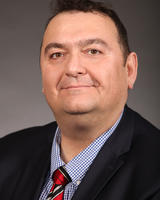
Dr. Nikolay Petrov, PH.D.
Assistant Professor of Religion
About
Dr. Nikolay (Nick) Petrov serves as Assistant Professor of Religion in the Department of Philosophy and Religion at The University of North Carolina at Pembroke. Dr. Petrov holds Diploma in Theology from Martin Luther Kolleg, Feldkirchen in Kärnten, Austria, Master of Divinity from Emory University, Atlanta, GA, and a Doctor of Philosophy in Religious Studies from Drew University, Madison, NJ.
Dr. Petrov is an interdisciplinary scholar with research centered in the broader area of the American Religious Studies and more specifically in the intersection of World Christianity and World Religions. Before coming to UNCP, where he presently teaches a variety of courses in Religion and Philosophy, he taught at Drew University Theological School and Missouri Valley College.
His recent publications include, Robert College of Constantinople: Crossroads of Faith, Cultures and Empires, 1863-1913, (Lanham: Rowman & Littlefield, Lexington Books, 2023) and "Post-Apocalyptic Mosaic: The Road and the Image of the Child as an Eschatological Symbol of Hope," The Child in Post-Apocalyptic Cinema, Television, and Literature, (Lanham: Rowman & Littlefield, Lexington Books, 2023).
Dr. Petrov’s current book project, Introduction to World Religions: A Student’s Guide to the History, Beliefs, and Practices of the Most Impactful Faith Traditions is a textbook designed for single-semester courses and will serve as an introductory resource for the study of religion. The author argues that the study and analysis of religious traditions provide a 'blueprint' for justice and peace among peoples and nations. This study will equip students with an appreciation for the diversity and complexity of the cultural and social world, challenging minds, and engaging in academic conversations with key concepts such as culture, diversity, gender, and sexuality within the context of World Religions.